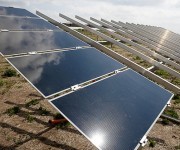policy
-
Economist smacks down skeptics for misreading his research
William D. Nordhaus — economist, Yale professor, serious person — has taken to a serious publication, The New York Review of Books, to put the smackdown on climate skeptics. The back story: Nordhaus has done working analysis of the economic impacts of implementing climate policies. In that awful Wall Street Journal op-ed we wrote about […]
-
Gainesville, Fla., becomes a world leader in solar power
Beating out Japan, France, and China in solar installed per capita, this small city proves you don't have to be big to go big on solar power.
-
Federal tax credits may handcuff clean energy development
This post originally appeared on Energy Self-Reliant States, a resource of the Institute for Local Self-Reliance’s New Rules Project. Clean energy advocates should cast aside their worries about increasing Republican scrutiny of energy subsidies. The clean energy industry’s foolish reliance on tax incentives has already handcuffed its expansion. Unlike the leading nations in the clean […]
-
Bigger subsidies make bigger solar a bad bet
This post originally appeared on Energy Self-Reliant States, a resource of the Institute for Local Self-Reliance’s New Rules Project. Americans seem unable to resist big things, and solar power plants are no exception. There may be no reasoning with an affinity for all things “super sized,” but the economics of large scale solar projects (and […]
-
Group purchase gets residential solar to grid parity in Los Angeles
This post originally appeared on Energy Self-Reliant States, a resource of the Institute for Local Self-Reliance’s New Rules Project. Back for a second round, the Open Neighborhoods organization in Los Angeles has organized another group purchase of residential and commercial solar PV, bringing the lifetime cost of solar well under the cost of grid electricity […]
-
Solar for Schools? Not so easy with tax-based solar incentives
You’re a city manager hoping to cut electricity costs at sewage treatment plant, a school administrator looking to power schools with solar, or a state park official needing an off-grid solar array for a remote ranger station. But unlike any private home or business, you can’t get 50% off using the federal tax incentives for […]
-
America and Germany Getting Their Clean Energy Just Desserts
Germany is the unquestioned world leader in renewable energy. By mid-2011, the European nation generated over 20 percent of its electricity from wind and solar power alone, and had created over 400,000 jobs in the industry. The sweet German success is no accident, however, and the following pie chart illustrates the results of a carefully […]
-
Feed-in tariffs responsible for most renewable energy
Cross-posted from CleanTechnica. Feed-in tariffs are a comprehensive renewable energy policy responsible for 64 percent of the world’s wind power and almost 90 percent of the world’s solar power (see charts below). With simplified grid connections, long-term contracts, and attractive prices for development, that’s policy that works. Image: David Jacobs Image: David Jacobs The basic […]
-
Why ‘market-based’ is poor criteria for solar policy
The energy market isn’t as free as we’d like to believe.Photo: USDAThis post originally appeared on Energy Self-Reliant States, a resource of the Institute for Local Self-Reliance’s New Rules Project. When it comes to solar policy in the U.S., there are three flavors: tax or cash incentives, long-term CLEAN Contracts, and solar renewable energy credit […]




